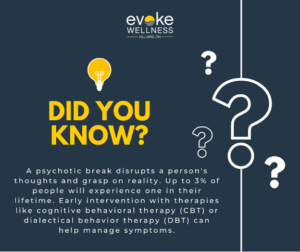You thought you had it together. A good job, a loving partner, a roof over your head. But lately, something feels off. You’re anxious and paranoid for no reason. You see and hear things that don’t make sense. Your thoughts race and you can’t concentrate. A psychotic break can happen to anyone, though factors like genetics, trauma, and substance abuse increase the risk. You may feel alone, but you’re not. Psychotic breaks affect 3% of the population. With compassionate care from Evoke Wellness, you can regain your balance.
Our evidence-based programs including:
- Cognitive Behavioral Therapy
- Dialectical Behavior Therapy
- Trauma-focused Therapy
- Individual and Group Therapy
- Psychotherapy
You don’t have to brave the darkness alone. We’re here to light the way.
If you or a loved one is considering treatment, Evoke Wellness at Hilliard invites you to contact us. Our compassionate team is ready to answer your questions, discuss your needs, and help you take the first steps toward recovery. In Hilliard, you’ll find more than just a treatment program – you’ll discover a community dedicated to your wellness and success. Together, let’s embrace the journey to recovery and the promise of a new beginning. Call us at (833) 949-1347 today or reach out online.
Understanding Psychotic Breaks
A psychotic break, also called a psychotic episode, refers to a temporary loss of contact with reality. Around 3% of people will experience one at some point in their lives. During a break, individuals may have trouble distinguishing what is real from what is not.
Common Symptoms
- Hallucinations (seeing, hearing, or feeling things that aren’t real)
- Delusions (false, irrational beliefs or thoughts)
- Disordered thinking and speech
- Unusual or bizarre behavior
Causes and Risk Factors
- Mental health conditions like schizophrenia, bipolar disorder, or severe depression
- Trauma, high stress, or lack of sleep
- Recreational drug use or medication side effects
With professional support, individuals can regain their mental wellbeing. You are not alone on this journey.
What Are the Symptoms of a Psychotic Break?
Loss of Reality
- Delusions – false, fixed beliefs that conflict with reality
- Hallucinations – seeing, hearing or feeling things that aren’t real
- Disorganized thoughts and speech that make little sense
Impaired Functioning
- Inability to perform daily tasks or communicate clearly
- Inappropriate emotional responses or lack of emotions
- Paranoia and suspicion about others’ motives
Behavior Changes
- Social withdrawal and isolation
- Lack of motivation and self-care
- Agitation, insomnia or erratic behavior

Evoke Wellness offers individual, group and specialized trauma therapy programs to support recovery. You are not alone on this journey.
What Causes Psychotic Breaks?
Psychotic breaks can stem from various underlying factors, both biological and environmental. According to recent studies, around 3% of people will experience a psychotic episode at some point in their lives.
Brain Chemistry Imbalances
- Disruptions in neurotransmitter levels like dopamine can trigger psychosis
- Conditions like schizophrenia often involve psychotic symptoms
Trauma and Severe Stress
- Highly stressful or traumatic life events may cause a break from reality
- Childhood abuse or PTSD can increase psychosis vulnerability
Substance Use Disorders
- Drugs like LSD, methamphetamines or excessive alcohol can induce psychosis
- Even marijuana has been linked to psychotic episodes in some cases
Other Potential Triggers
- Sleep deprivation and extreme lack of rest
- Some medical conditions like brain tumors or injuries
- Postpartum psychosis after giving birth
Seeking professional treatment is crucial for managing psychotic symptoms and addressing root causes. Evoke Wellness offers evidence-based therapies like CBT, DBT, trauma therapy, and psychotherapy to support recovery.
Getting Help for a Psychotic Break
If you or a loved one experiences a psychotic break, it’s crucial to seek professional help immediately. Roughly 3% of people will experience a psychotic episode in their lifetime. With proper treatment and support, recovery is possible.
Inpatient Care
For severe psychosis, hospitalization may be necessary to stabilize the condition and ensure safety. Inpatient treatment provides:
- 24/7 monitoring and care
- Medication management
- Therapy and counseling
With the right intervention and adherence to the treatment plan, individuals can manage psychotic symptoms and regain control over their mental health.
Treatment Options for Psychotic Breaks
Cognitive Behavioral Therapy (CBT)
CBT aims to reshape negative thought patterns contributing to psychosis. Through structured sessions, individuals learn coping strategies and ways to challenge delusional thinking.
- Identify and modify unhelpful beliefs
- Practice relaxation techniques
- Build problem-solving skills
Dialectical Behavior Therapy (DBT) Program
This type of CBT teaches mindfulness and emotional regulation. The goal is better control over intense emotions that may trigger psychotic episodes.
- Improve interpersonal effectiveness
- Develop distress tolerance abilities
- Practice mindfulness exercises
Individual and Group Therapy
One-on-one counseling explores the root causes and effects of psychotic symptoms. Group sessions provide peer support and shared coping strategies.
- Uncover underlying trauma or stressors
- Gain insight into psychosis triggers
- Build a supportive community
Psychotherapy, trauma therapy, and prescribed medications are other vital components of treatment plans. With comprehensive care, many individuals can manage psychotic breaks and live fulfilling lives.
FAQs on Psychotic Breaks
What is a psychotic break?
- A psychotic break involves a temporary loss of contact with reality, often including hallucinations or delusions.
- Estimates suggest around 3 in 100 people will experience a psychotic episode at some point in their lives.
What causes psychotic breaks?
Psychotic breaks can stem from various factors, such as:
- Extreme stress or trauma
- Mental health conditions like schizophrenia or bipolar disorder
- Substance abuse
- Lack of sleep
- Medical issues affecting the brain
How are psychotic breaks treated?
Treatment depends on the underlying cause but may involve:
- Antipsychotic medications to reduce symptoms
- Psychotherapy like Cognitive Behavioral Therapy or Dialectical Behavior Therapy
- Individual, group, or family counseling
- Trauma-focused therapies for PTSD
- Addressing lifestyle factors like diet and sleep
With professional support, many recover and manage future episodes. Seeking help early is crucial.
Conclusion
As you navigate a psychotic break, remember you are not alone. Over 3 million people are diagnosed with psychotic disorders annually in the US. With proper treatment like cognitive behavioral therapy, dialectical behavioral therapy, individual and group therapy, trauma therapy, and psychotherapy programs, many find hope and healing. Seek help from mental health professionals and support groups to better understand your symptoms. You have the inner strength to overcome this challenge. Take things one day at a time, and be patient with yourself. With compassion and courage, you can get through this difficult time. There are many who have walked this path before you, and many who will walk alongside you now. You are stronger than you know.
Begin Your Journey with Evoke Wellness at Hilliard
If you or a loved one is considering treatment, Evoke Wellness at Hilliard invites you to contact us. Our compassionate team is ready to answer your questions, discuss your needs, and help you take the first steps toward recovery. In Hilliard, you’ll find more than just a treatment program – you’ll discover a community dedicated to your wellness and success. Together, let’s embrace the journey to recovery and the promise of a new beginning. Call us at (833) 949-1347 today or reach out online.



